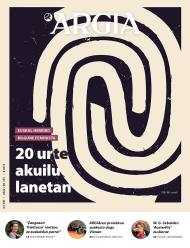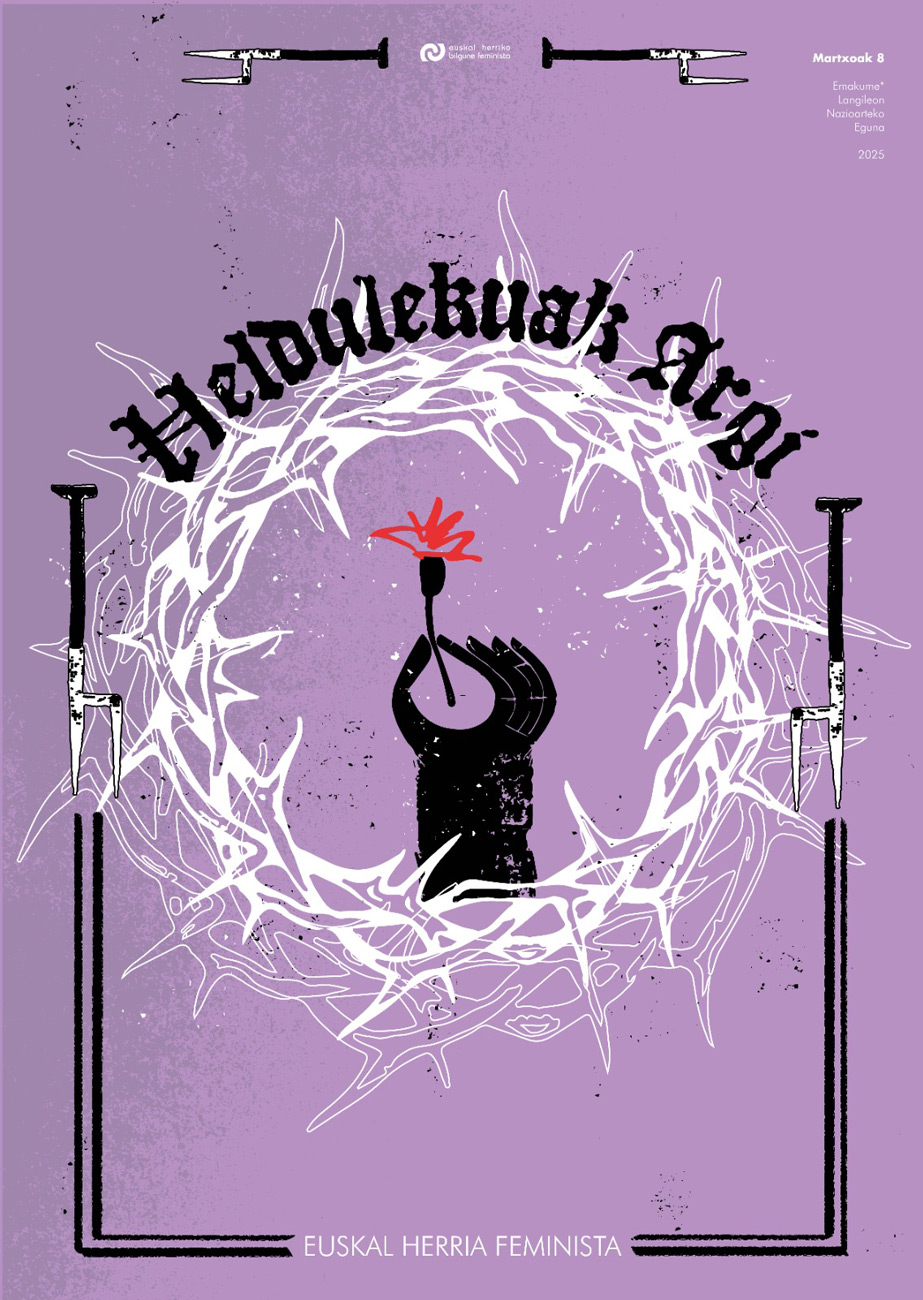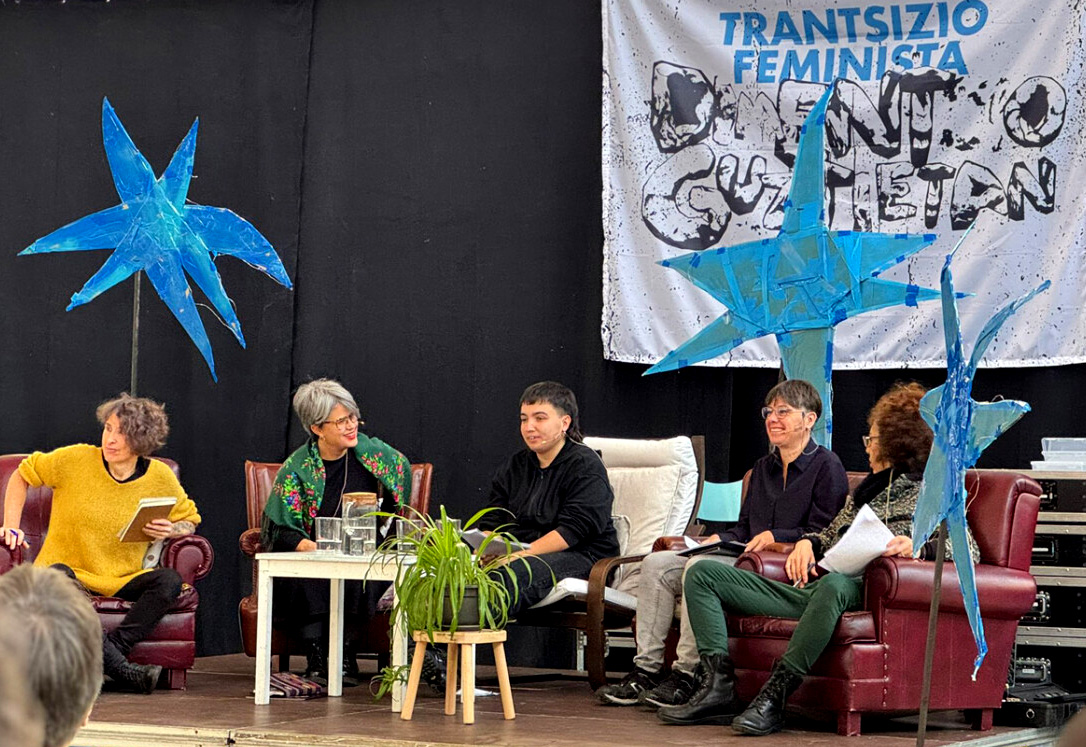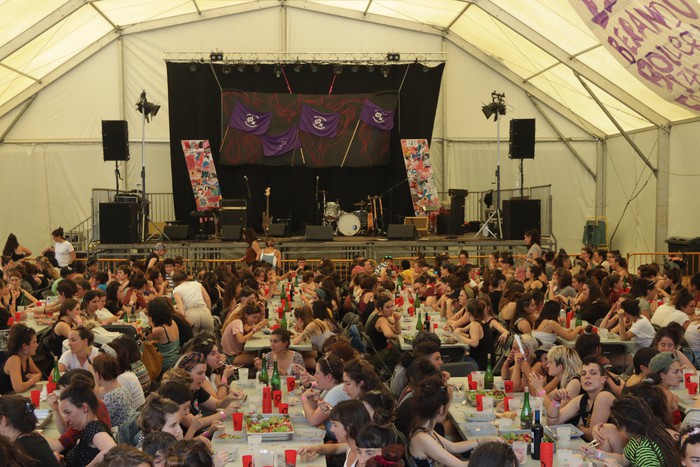"We had the north, but we've dared to go one more lap."
- One that twenty years ago was at the foundation of the Feminist Forum of the Basque Country – Edurne Epelde Pagola – one that was recently partner – Oihane Landazabal Bernabeu – and one that entered this group in the midst of two decades – Amaia Zufia Erdozain. We have brought together the three and referred to the twenty years of the Feminist Forum of the Basque Country: the path we have taken, the challenges and goals we have set for the future, and the reflections and projects they have today. We have nothing to say. They have talked to us between staff and collective, combining collective and personal tours and reflections.
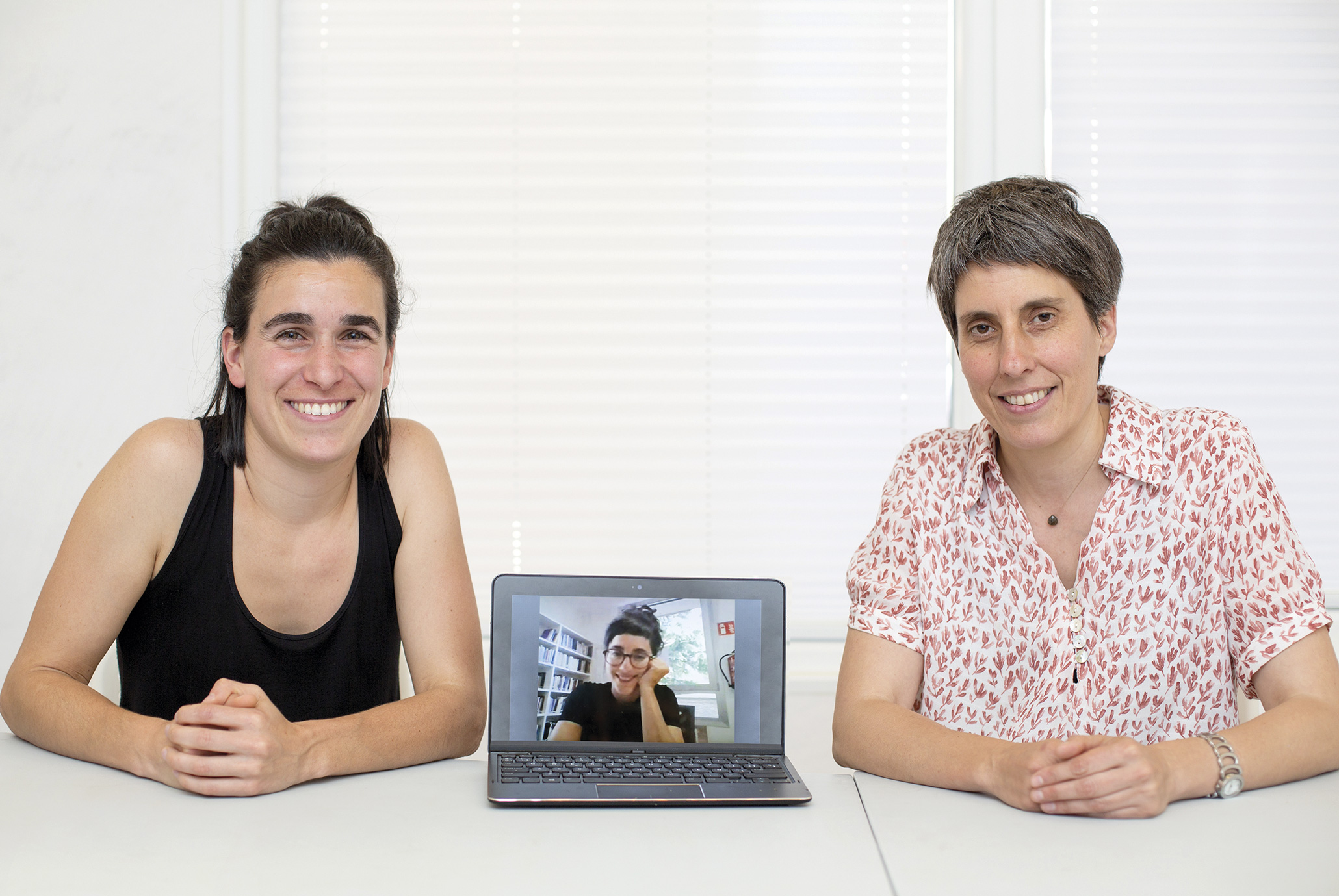
When and how did they start militating at the Feminist Forum of the Basque Country?
Edurne Epelde: I started in 2001 with the Encounters of Nationalist and Feminist Women held in Leitza before the creation of the Basque Feminist Bilgune (BF). Two friends, who I think were unrelated to each other, proposed to explain to me that there was an intention to create an agent. The Zarautz Witch was militant in the women's group and with what I heard I immediately felt my desire to be in it. I was very excited to think and influence the Basque Country. I saw it was necessary because my experience of the time was that feminism was nothing welcome, that it was not much quoted and that it was a secondary struggle.
Amaia Zufia: I started in 2014, just before the Ondarroa Meetings. Here we present the proposal of feminist sovereignty. I was more of the youth movement, and in recent years I met feminism. For me, it was an important turning point of the 2012 Leitza Meetings, where I learned everything, the juerga we did… Then came some meetings of the youth movement, we created a working group to reflect on the forms of relationship and the model of militancy, and I mainly referred to feminism. Then I received the proposal to enter the BF. I encouraged myself, because it seemed to me that all the roads that I've worked on could converge with the BF, both personally and collectively.
Oihane Landazabal: I entered last year. In my feminist militancy it has not been incorporated into the BF, I come from the Young Girls movement of the Basque Country. I have participated in different meetings, I remember that he was the first of Ondarroa, therefore from quite young, very receptive and spectator. The BF has always been a reference and at the end of the young cycle I have incorporated myself very naturally. It is an organization that represents a feminist process for the Basque Country and from the Basque Country, in Basque and in Basque, and I represent my contribution.
In 2001 they published BF a year later, based on the initiative “We are going to create a Basque Country based on equality”. What were the reasons and what was the mood of the time?
R. Tempered: The environment is important. I believe that at that time the idea, ideology and desire to make national construction prevailed in the people we were in the militancy or in the national liberation movement. I remember a politically very confusing era: the very vivid armed political conflict, although also in previous decades, but in the 2000s it was incandescent; the process of illegalization started then, and that brought arrests, terrors, responses from many militants, but also the desire to build at the same time. The creation of the BF fits it perfectly: the desire to build a people, a people that has the foundations of equality. Egizane decided to cut her career, the Abertzale left built an internal feminist process... In this environment, in March 2001, a number of women from different places were gathered who were named feminists and nationalists, focusing on the desire to create a Basque Country based on equality. In Leitza the first nationalist and feminist meetings were organized. Considerable penetration work started. It was proposed to perform a zonal diagnosis in which the need for an agent was confirmed.In general, the demand for feminism was a disaster: there was
no perceived need in the environment; the feminist movement last met in 1994; there were small alliances linked to the alarm or platform of the World Women's March, but the assemblies were not very quick; in the rest of the collective struggles and in the process of national liberation feminism was secondary... It needed an agent to act as such and I remember we created it. We felt the need to do different, because we couldn't do it in the militancy model of the popular liberation movement until then, but at the same time we didn't know how to do it, because we also belonged to that school [laughter]. It's curious that we came together with those in the national liberation movement and those of us who were more in groups of women or feminists. In the ways of doing there was also a clash between us, and we started putting them on the table.
Oihane, at age 8, it's hard for you, but Amaia, do you remember the beginning?
A. Zufia: I don't remember birth, I was 12 years old. In my high school age I remember as a Basque feminist referent in popular movement. In feminism there have been many debates and has been a reference to understand what they mean by our words and moving us to our context. Beyond that, I would say that in my adolescence and youth I was always a beacon, to get flesh and nutrition around various personal knots, whether it be sexuality, aggression or pleasure.
R. Tempered: When Zufi [Amaia] says that for him he was a source, besides feeling proud, I say “jo, what were the feminist sources in our time?” They were very few. There was feminist theory or queer theory, but there was not Euskal Herriratuak, translated… Since 2015 a lot has been published in Basque on feminism, but until then almost nothing had been published in Basque on feminism. We got a lot of reports [laughs], I agree with that and we had material to work and debate. But formal publications -- at another time we didn't have Lisipe, we had reports. These debates did not come to us. At first our logic was not sovereignty, ours was the recognition of rights: in this country women are half the population and the recognition of our rights is essential. That gave us a good line of work at the time, which was then completely exhausted, but what we got, on the one hand, with the Charter of the Rights of Basque Women that was published in 2007 and before in terms of text, what are rights? What is citizenship? What is private?– “The personal is political,” we all say today, but then it was not formally learned from feminism. We were there and we were doing what we could.
H. Countryside: I have no memory, but I guess he not only asked him to die in feminism, to appropriate the foundations, currents and debates, but he also had to focus on feminism. This would involve enormous tension, sweating and tremendous work, even more so, because there was a responsibility to put it on a Basque scale.
"I am in the genesis of the BF, in the construction of a people, a people with the foundations of
equality" Edurne Epelde
R. Tempered: In this sense, our presence was unpleasant, and it was moments of great tension. Because in the end we always arrived with our asterisk (“you have not included this section”, “from the point of view of equality this and that”, “are there female militants in the mixed areas of the collectives?”). It was a dance between interpellation and collaboration. It was very intense, but at the same time we were becoming increasingly convinced, and gradually the feminists who weren't in the agents began to work. This network was winding down. That was the idea: to be a meeting point that would bring together all feminist women. It didn't become the only hat of feminism, maybe we imagined it that way at the time, but it didn't.
How has the road been made? High-speed? Is it difficult and possible? One step forward and four steps back?
R. Tempered: I have no memories of what we had afterwards. I have the feeling that the steps taken have been sound. We have been responding to the needs we had in our reality, recognizing that the initial political ambition was very great – to create a charter of rights, a council of women that would give it guarantees…. We had the north and well, we've been assuming where we were at every moment, we've dared to transform that north, we've dared to take a new spin. From their location and environment, I would never have imagined that it was possible today. When feminist theory has begun to become popular, the BF has made a constant exercise to worship those sources and I think we have been able to respond step by step to the needs and desires that were today. Euskera has been a tool in the groups of women of the peoples, but at the time of the alliances the BF decidedly committed itself to the feminism of creating and naming in Basque. Perhaps some do not dare to recognize, but I do: that basis we have laid has made it possible for feminism to also occur in Basque.
What others would you highlight in these twenty years?
A. Zufia: The same initially was represented a BF that would reward feminists by areas, but then the practice led us to organize ourselves in the villages. Life takes place in the villages: close processes, alliances, activation of protocols against violence... Among the peoples there have been very diverse tours, militants of different origins and lines have joined together. I would say there are many families within the BF, and for me the sum of all makes the BF so interesting.
Moreover, in 2009 there was a very important turning point. We enter the Meetings of Tolosa in the debate of identities and feminist subject. It was important to open and open its windows, to learn from other discourses and practices, and to lose the fear of the unknown. This and the model of militancy based on the care of processes and people have brought us here – to the point of being interlocutors for many political and social agents and having a lot of alliances in the feminist movement.
R. Tempered: In 2014, when we started talking about feminist sovereignty, the feminist transition, there is a change in our readings: a leap is made with the claim of territorial and corporal sovereignty, closely linked to the Meetings of Tolosa that Zufi has uncovered [Amaia]. It is a logical development followed by a long trajectory of care, self-defense or feminist complementation.
H. Countryside: I have received a very politically and ideologically educated BF, with very strong proposals. You know the casings, how they have come here, but it is true that today it is a meaningful organization and, as Amaia says, there is an agent acting. When the new generations are politicized from feminism, we have been able and successful in taking that wave. We are breaking the feminist movement of people into people.
R. Tempered: The BF and the local dynamics at the level of the Basque Country are perfectly related, of course, but there are many BF within the BF. At the local level, we have maintained alliances and coordinators, with different generations and collectives, seeking consensus in the discourses. It has been very rich and we have maintained on 8 March, 25 November, 28 June. And often not in our name.
Meeting and alliances seeking balance between the two.
R. Tempered: We have also reflected and it is true that many times we have set aside the last name of the BF because we dream of a more real alliance. I believe that we have succeeded in this approach.
H. Countryside: In view of the strategic need for a broad alliance, we have devoted all our investments to this. Because we believe in it. But it is true that to make some small imbalance from time to time would be good: there are many of us who say that we have to make hidden jobs visible… what secret work is done from BF! From time to time, knowing what the priorities are, it is important to give one place and give recognition… but we do not know how to do the other.
A. Zufia: The other difference in this coin is that maybe we haven't looked so much at the BF spaces. A general strike, then March 8, then November 25, then the abortion comes I don’t know what… the intensity is so great! So, of course, we haven't been so careful about some BF dating or ingredients for fun. Perhaps at the time of attracting new people militancy is not that attractive. We often look for spaces in feminism for personal growth and to form our tribe. It gets unbalanced from one side to the other… The key is in that balance.
"We are many families within the BF and the sum of all makes the BF so
interesting" Amaia Zufia
R. Tempered: Aware of this imbalance, I recall that at the Ondarroa Meetings we said “let’s calm the BF!” The BF has
intersectional reading. Let's go through our corners, a trajectory covered by the decolonial criticism has just taken the book out with Emagin's friends. How is the decolonal process started?
A. Zufia: In the book we talk about the clak we have had around personal and collective situations. What discomforts, what itching, what anger we have felt, what interpellations we have received, what generosity also from some members of the militancy… It has been the road we have travelled for years, among others, in the World March of Euskal Herria or the hand of Women of the World. Another great group of clak was that of the decolonal round table of Salda Dago de Durango. We have asked ourselves several questions: What role do we want to play in the fight against racism as Basque and white women? What is wrong with us? What bridges will we build with migrant and racist women? What feminist and antiracist agenda should we articulate Basque? What are the racist attitudes that we reproduce? What privileges do we have? How to extend the Basque society to the migrated members?
R. Tempered: The role played by the Basques in creating the citizenship model of white modernity, the complicity we have in colonization and neocolonization ...
H. Countryside: It is up to us to make a responsible reading of the colonization processes, yes, to update our gaze. What happens is, and in the internal process that we have carried out it has come out honestly, being a cultured and linguistically oppressed people, that somehow we need to build a shared story also of “our”. In this globalized world, the stateless nation and the mere fact that language is a minority is an exercise in survival, and I think we strengthen it there. It will be normal… One of the keys is mutual recognition and empathy, I believe. It is true that it is a subject that moves us, but we have opened the door and that is also the courageous decision, the political agenda and the priorities.
A. Zufia: We have opted for a plural subject, not a single and homogeneous subject, because reality is very diverse. I would say that this is the greatest potential of feminism. Sometimes it is also a difficulty, because it is not easy to manage the difference, to listen and to recognize oneself. One of the great objectives is to enable spaces for struggle without concealing situations of discrimination between us.
R. Tempered: The BF has always been obsessed with giving voice to marginal groups. With women from different backgrounds, a great effort of collaboration has always been made and we have created complicit relations and nice alliances. I remember the issue of home employees coming up again and again. The request of the members of the association of household employees was consistent that we put their fight at the forefront. We didn't do it and it was slowing down. Why? Because none of us was a household worker? We have always had contact with these collectives, but we have always prioritized the issues that have moved us most. External demands and questions have been growing and we have set out to do that exercise we had not done. This puts us in a situation where it is up to us to work on conflict management capabilities. We have no more options. I feel that on this issue of privilege things often explode aggressively and that work is about to do.
H. Countryside: If we have been able to incorporate from feminism new perspectives on the political conflict in Euskal Herria, we must be able to address in another way and from another place any conflict situation.
R. Tempered: At the same time, without conflict, things do not change. I empathize very much with the issue of decolonality, because now we are reproached for what we said with mixed spaces. We thought, then, that sometimes the conflict had to explode, because nothing changes if it is not uncomfortable for it.
"Many times we have abandoned the last name of the BF because we dream of a more real alliance"
Edurne Epelde
From woman to woman* and calls to women, boots and trans to Oñati. There is also a reflection on the subject of feminism.
R. Tempered: Around 2009, coinciding with the creation of transfeminism in the Basque Country, we created a “working group on sexuality”. In the course of the working group we have published two documents of interest: Debate on sexuality 2013, which questions the sex-gender interity and Transsexualities 2018, notebook for educators and activists. I believe that in addition to the female category, and beyond, we are trying to make known other identities and appointments. In fact, some members are not so comfortable in the female category and others still feel necessary. We are engaged in an interesting debate, at the moment we have more questions than answers and appropriate formulas.
H. Countryside: Indeed. We've said before that it's a plural feminist movement, we're forming a polyhedral subject. This also requires looking at bodies, sexualities and non-hegemonic identities. It is true that we are entering into speeches and appointments, and it is important because it generates new realities. But we still have to reflect in our movement and in our practices, we have to reorganize and transform the spaces of militancy, until they are stimulating for all.
Intersectional and class vision. This issue has taken its place again. How do you look at that debate?
R. Tempered: In the book Lisipe we highlight the idea of the multiple boss monster: the enemy we want to demolish is a multi-headed monster. That monster is the same for everyone, when we then look at it each makes its own interpretation, designates the transformation process in its own way. The struggle has been imposed on the subject and I don't like hostility between us, because even if the reading is different, the society we want to transform is the same, right? In addition, we live in the same people, so I think we can do something together. Reading, the way, understanding have been good – and 40 years ago we also had this kind of debate, it is not new and we have lived together.
A. Zufia: I think there is sometimes a false dichotomy. On the one hand there is the world of identities and on the other there is the material world. Talking about identities, heterosis, binarism, transexuality is seen almost as something soft, as something neoliberalism can easily assume. That is so false! Both are intimately related: to be recognized, to be who, is the basic condition to cope with situations of exploitation. In this sense, feminism has extended this monolithic left hegemonic subject, warning that the system of domination is very diverse. This monster has multiple heads and who hits roughly hard. Thus, the subject is also diverse, there are different identities of subjects that we will have to return because different situations of oppression intersect. Rather than trenches, we have to look for goals to articulate common struggles, find levers. I think there are many by nature, but…
O. Countryside: The forms of slavery and oppression of capitalism have changed, requiring new responses and new logics. We must fight for all sides of the system, understanding oppression in an articulate way. And that requires a renewed labor struggle, led by a common but plural liberator subject.
"We must fight for all corners of the system, understanding oppression in an articulated way"
Oihane Landazabal
R. Tempered: The BF has always been claiming material conditions of life and these demands are more necessary than ever. It seems that we are a little ruthless in some theoretical debates rather than claiming them on the street. It's time to fight for material living conditions, and it seems we still have something lost, because if we weren't where we are. We're not on the street yet, but if that comes, and I think we're going to join, because we're not going to stay any longer. This materialistic view has always been taken in the BF, for example in the document Premises of Dignity in 2009.
H. Countryside: I would add that from feminism we are also looking and recognizing all this to support life, proposing a comprehensive view of work. I think we have succeeded in putting on the table the logic of the binomial life versus capital.
Let's look to the future. How did you want CF and feminist movement in 20 years?
A. Zufia: I'm going to start making a toast in the sun. I imagine that the BF will meet to make an assessment on the achievement of the Basque community public surveillance; the withdrawal of the foreign law; the celebration of the last repatriation of the political prisoner and the inclusion of the feminist reading in his account; the proposal to improve the public and sovereign Basque educational system; the opening of a non-binary view and of more liberating relations about the Basque body and sexuality; the acquisition of a trans-Basque law.
R. Tempered: I liked the dream, closed my eyes and joined!
H. Countryside: I don't know if it's so optimistic, but I do imagine it in another stadium and with new scenarios. Twenty years ago we would certainly not imagine the need for a Community public system and that we would be putting the roadmap to it at the centre. I think from that premise we should exercise. I am led by a BF that conditions political decisions, on the road to a sovereign and feminist Basque Country, that poses new challenges to this country, and that leads these new debates and orientations together with the feminist movement.
A. Zufia: I would add that I imagine that there will be a political and affective community, whatever its name, that knows how to organize, take care of itself, enjoy and fight.
H. Countryside: I can certainly say that there will be one who takes the witness, and that allows us to imagine a near future with ambition. We have a powerful BF, which qualitatively has a great weight in this country.
Feminist Encounters are at your disposal in Oñati. What time will it be for you?
H. Countryside: It must be especially a moment of celebration. Enjoy, be together and meet us. The meetings must serve to bring value to what we have done and to tackle the challenges we have. And, of course, also to strengthen the BF network!
A. Zufia: They told us that one of the greatest achievements of the first years was the flickering and existence of amusement spaces in BF. That too is political. There arise the affective relationships, the leagues and everything, and for that we also militate. So I think these encounters are an explosion of those initial accomplishments. Let us see the explosion! [laughter].
R. Tempered: I meet. For me it is special because the BF has never organized a big party of this kind and has dared to prioritize an initiative in the form of celebration. Because we deserve it. If we dream of a community where our affective relationships and our bodies will be independent, we must put it into practice. There will be a great practice to gather, to find, to link… It will also be a meeting of women of different ages, for me that is important. The commitment to organize in Oñati is also courageous. The funny thing is that the BF has always chosen villages. We have to be united because the times we are living are not easy in many ways. The spaces that will offer us meeting spaces are more necessary than ever, it is more necessary to reclaim the collective than ever before. In feminism there are also many nominations – and they are needed – but the BF is a great example of what feminism can do collectively. Proof of this will be this weekend.
Twenty years ago, on April 20, 2002, from Donostia the Feminist Assembly of the Basque Country:

(Photo: Foku, Andoni Canellada)
Bilgune Feministak Heldulekuak argi, Euskal Herria feminista leloa baliatu du M8an, azpimarratzeko feminismoak ematen dituela “datorrenari aurre egiteko tresnak”, eta gogorarazteko faxismoaren gorakadaren testuinguru hau helduleku horretatik irakurri eta borrokatu... [+]
Euskal Herriko Bilgune Feministak deituta elkarretaratzea egin dute Hernanin Iratxe Sorzabali elkartasuna adierazi eta "babes osoa" emateko. Inkomunikatuta egon zen uneak berriz ere epailearen aurrean kontatu behar izatea, "bizi izandakoak utzitako ondorioen... [+]
On March 8, the Feminist Movement of the Basque Country announced a strike in favor of the public care system for the fall, as care cannot remain business. Now, through the streets, through the neighborhoods, through the villages, you have to articulate the movement of that... [+]
Hogei urte beteko ditu aurten Bilgune Feministak, eta urtemugaren ospakizunari merezi duen tokia egin diote urteko eginbeharren zerrendan. 20 urtez paradisuak erretzen... Eztandak dardara gaitzala lelopean, datozen hilabeteetan hainbat herritan ospakizun ekimenak egiteko asmoa... [+]









